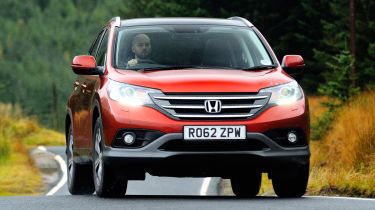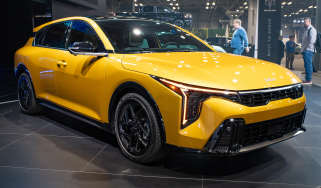Honda CR-V
Long-established SUV gets efficiency and quality updates
There's no shame in last place for the Honda. It scores highly for practicality and comfort, and the revised looks are fashionable and modern. Yet it doesn’t outperform its rivals in any one area, and has neither the pulling power of the Hyundai nor the efficiency of the Mazda. The price is steep, too.
The first-generation CR-V proved to be such a big hit in Europe that Honda moved the entire production line to the UK.
That turned out to be a wise decision: the popularity of small SUVs has grown rapidly in the 12 years since the switch. To ensure the latest CR-V keeps pace with buyers’ demands, Honda has given it a thorough refresh, focusing on improving efficiency and build quality.
The most obvious update is the rugged new styling. Whereas the outgoing model looked very car-like, this CR-V shouts louder about its off-road intent. A bolder front end features a sloped three-bar grille that blends neatly into the swept headlamps and LED lighting strips. Chunky plastic body mouldings contrast well with our car’s Passion Red pearlescent paint.
As on the old CR-V, the rear lights mirror the kinked shape of the wide C-pillars. But there’s no getting away from the fact that this car looks remarkably similar to the Hyundai Santa Fe.
Used - available now
At least the Honda feels different inside. Fans of the old model will recognise the cabin layout instantly, but you can tell a real effort has been made to improve quality. Run a finger along the soft-touch dashboard and it’s hard to feel any hard plastic or unsightly panel gaps. The upright driving position and high gearlever make it easy to get comfortable in the electrically adjustable leather seats.
To reflect other brands’ naming strategies, the CR-V is now available in S, SE, SR or EX trims, and the top-spec model we’re testing comes loaded with luxury kit. Sat-nav and a panoramic glass roof are standard, plus the Honda is the only car here with a powered tailgate. However, it’s not exactly perfect. The dash buttons are small and fiddly to use and the ‘intelligent Multi Information Display’ above the sat-nav seems like an afterthought.
Still, this new CR-V is more practical than ever – despite being 30mm shorter than before, its boot is a decent 147 litres larger, at 589 litres. Rear seat passengers sit lower, which improves headroom, and legroom is also impressive: the flat transmission tunnel leaves room for three adults’ feet. When you pull a handle in the boot, the rear seatbases flip out and their backs fold down, giving a flat load bay that will hold 1,669 litres.
While this added versatility is welcome, Honda has made less progress with the CR-V’s drivetrain. The 2.2-litre engine produces the same 148bhp and 350Nm as before, but stop-start and aero upgrades help it to emit 12 per cent less CO2 and return a claimed 48.7mpg.
Hit the ECON button on the dash and the throttle response is dulled, plus the dials go green when you drive efficiently. Despite this, the CR-V doesn’t come close to matching the lightweight Mazda CX-5 at the pumps, as our fuel economy figure of 30.5mpg shows.
The Honda struggled to keep up at the track, too: it has the least power here and was the slowest to respond during our in-gear acceleration tests. Still, the six-speed manual gearbox has a quick, accurate throw and the steering is well weighted, so the CR-V corners with a lot more verve than the bulky Santa Fe. It’s refined at lower speeds, yet changes to the damper rates mean the ride gets bouncy if you hit a series of bumps on the motorway at the wrong frequency. Wind and road noise become more intrusive at higher speeds, too.
Like the Mazda’s system, the Honda’s four-wheel-drive set-up has an on-road bias, with an electric motor engaging a clutch at the rear whenever it senses that the car’s front wheels are losing their grip. Hill descent control is only available on automatic models.
So while the CR-V matches its rivals in most key areas, it fails to set any new benchmarks. It’s pricier than the Hyundai and Mazda, but suffers from poorer residual values and will cost more to run. As a result, it may struggle to leave its mark on this competitive class.











